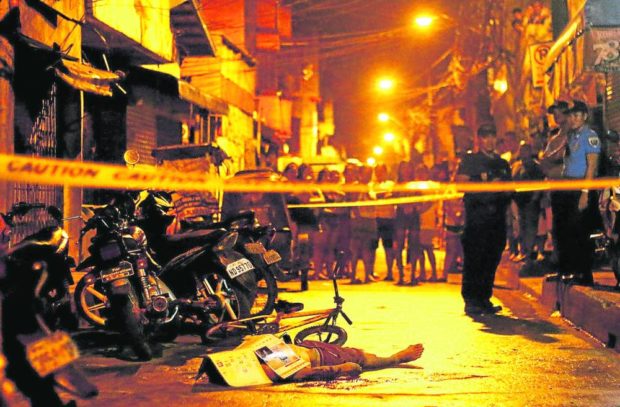Jurisdiction issue a ‘script, line’ to attack ICC – rights advocate

DUBIOUS CIRCUMSTANCES | The Institute for Nationalist Studies has monitored 80 cases of people slain in dubious state operations or by unidentified assailants that were reminiscent of the killing of drug suspects, including one Aldrin de Guzman in Pasig City in this Feb. 1, 2017, file photo. (File photo by RICHARD A. REYES / Philippine Daily Inquirer)
MANILA, Philippines — The International Criminal Court’s (ICC) supposed lack of authority over the Philippines was just “a line” being parroted by government officials to attack the court, a rights advocate said on Sunday, as lawyers representing the kin of drug war victims criticized lawmakers for providing former President Rodrigo Duterte “with a blanket of protection.”
“That issue — that the ICC has no jurisdiction — is [just] a line, the script,” Human Rights Watch (HRW) senior researcher Carlos Conde told the Inquirer. “Although it’s a wrong assertion, it serves a political purpose: their way of attacking the ICC and their way of defending the indefensible.”
He pointed out that while the ICC may no longer have jurisdiction over the Philippines, it retains its authority over crimes that were committed while the country was still a party to the Rome Statute.
“The issue is not whether ICC has jurisdiction over the Philippines because it doesn’t, not anymore. But the ICC definitely has jurisdiction over alleged crimes committed when the Philippines was under ICC jurisdiction,” Conde said.
“[There is a] huge difference,” he pointed out, adding: “The jurisdiction issue is about crimes, not the country.”
Alliance
President Ferdinand Marcos Jr. earlier told reporters that there were “many questions” about the ICC’s jurisdiction after its Pre-Trial Chamber (PTC) allowed in January its prosecutor, Karim Khan, to pursue a full investigation into alleged crimes against humanity committed under the drug war during Duterte’s terms as president and Davao City mayor.
However, Marcos, who had forged an alliance with Duterte’s daughter, Sara Duterte, said he did not consider the ICC decision “a legitimate judgment.” He also called the probe “an intrusion into our internal matters and a threat to our sovereignty.”
“So until those questions of jurisdiction and the effects on the sovereignty of the republic are sufficiently answered, I cannot cooperate with them,” the President said on Saturday in Baguio City, where he attended the Philippine Military Academy’s annual alumni homecoming.
This line of argument has repeatedly been raised by government officials before the ICC, citing the country’s withdrawal from the Rome Statute in 2017.
But both the PTC and even the Supreme Court have said that the government was obliged to cooperate, as Article 27 of the Rome Statute stated that all proceedings done prior to withdrawal remained valid.
‘Unwilling and unable’
While the ICC has yet to name the individuals who could be charged, all eyes are on Duterte and his former police chief, now Sen. Ronald dela Rosa, for being the drug war’s main architects.
Two rights lawyers, meanwhile, took issue with the resolution in the House of Representatives filed by some lawmakers, including Senior Deputy Speaker and former President Gloria Macapagal-Arroyo, who vowed “unequivocal defense” for Duterte.
According to Neri Colmenares and Kristina Conti, who represent the victims of extrajudicial killings being investigated by the ICC, the lawmakers’ action “only emphasizes the need for an investigation by the court.”
“Providing a blanket of protection only points [out] that there can be no fair, comprehensive and objective inquiry into the thousands of deaths from Duterte’s ‘war on drugs,’” the two said. “This reiterates that the government is unwilling and unable to investigate, and that the executive and legislative branches of government verily make justice inaccessible.”
‘How impunity perpetuates’
In House Resolution No. 780, Arroyo and 18 other representatives called on their colleagues to defend Duterte against the ICC, noting his “remarkable accomplishments” during his term, particularly against illegal drugs, criminality, insurgency and corruption.
Colmenares and Conti said the resolution was an “assiduous resistance to fact-finding” that was evident during Arroyo’s term as president from 2001 to 2009, when cases of extrajudicial killings, desaparecidos and torture were rampant.
“In choosing to ignore grave rights violations and abuses, politicians enable and empower violators and abusers. This is how impunity perpetuates,” the lawyers said in a statement.
They noted that the resolution “was suspiciously immature” as there was no trial or accused yet—although they believed it would “not be a hindrance to the ICC investigation.”
Conti earlier explained that even if the Philippine government were to appeal the PTC decision, the Office of the Prosecutor could begin gathering evidence and documentation pending a categorical order from the Appeals Chamber.
She and Colmenares said the ICC could even “find value” in looking into the basis of the House resolution.